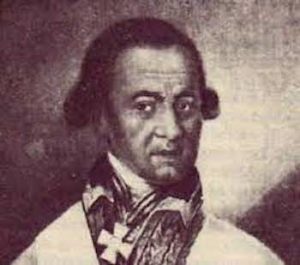
Anton Amo
*The birth of Anton Amo is celebrated on this date in c. 1703. He was a Black African professor and philosopher.
Anton Wilhelm Amo was a Nzema (an Akan people). He was born in Axim in the Western region of present-day Ghana, but at about four, he was taken to Amsterdam by the Dutch West India Company. He was given as a "present" to Anthony Ulrich, Duke of Brunswick-Wolfenbüttel, to whose palace in Wolfenbüttel he was taken.
Amo was baptized, treated as a member of the Duke's family, and educated at the Wolfenbüttel Ritter-Akademie (1717–21) and the University of Helmstedt (1721–27). Amo was the first African-born person known to have attended a European university. He went on to the University of Halle Law School in 1727. He finished his preliminary studies within two years, titling his thesis Dissertatio Inauguralis de Jure Maurorum in Europa (1729). This manuscript on The Rights of Moors in Europe is lost, but a summary was published in his university's Annals (1730).
For further studies, Amo moved to the University of Wittenberg, studying logic, metaphysics, physiology, astronomy, history, law, theology, politics, and medicine, and he mastered six languages (English, French, Dutch, Latin, Greek, and German). His medical education, in particular, was to play a central role in much of his later philosophical thought. He gained his doctorate in philosophy at Wittenberg in 1734; his thesis (published as On the Absence of Sensation in the Human Mind and its Presence in our Organic and Living Body) argued against Cartesian dualism in favor of a broad materialist account of the person. He accepted that it is correct to talk of a mind or soul but argued that it is the body rather than the mind which perceives and feels. In 1736 he was made a professor.
From his lectures, he produced his second major work in 1738, Treatise on the Art of Philosophizing Soberly and Accurately, in which he developed an empiricist epistemology. In it, he also examined and criticized faults such as intellectual dishonesty, dogmatism, and prejudice. The Duke of Brunswick-Wolfenbüttel had died in 1735, leaving him without his long-standing patron and protector. That coincided with social changes in Germany, which was becoming intellectually and morally narrower and less liberal.
In 1740 Amo took up a post in philosophy at the University of Jena, but while there, he experienced several changes for the worse. Many argued against the secularization of education (and against the rights of Africans in Europe). They were regaining their ascendancy over those who campaigned for greater academic and social freedom, such as Christian Wolff. Amo was subjected to an abusive campaign by some of his antagonists, including a public lampoon staged at a theatre in Halle.
He finally decided to return to the land of his birth. He set sail on a Dutch West India Company ship to Ghana via Guinea, arriving in about 1747; his father and a sister were still living there. His life from then on becomes more obscure. According to at least one report, he was taken to a Dutch fortress, Fort San Sebastian in Shama, in the 1750s, possibly to prevent him from sowing dissent among his people. The exact date, place, and manner of his death are unknown; Anton Wilhelm Amo died in about 1759 at the fort in Shama in Ghana.

Amo is cited in Abbé Grégoire's De la littérature des nègres (1808). In August 2020, in the context of the 'decolonization' of place names following the murder of George Floyd, the German capital Berlin decided to rename its Mohrenstraße to "Anton-Wilhelm-Amo-Straße" in his honor.